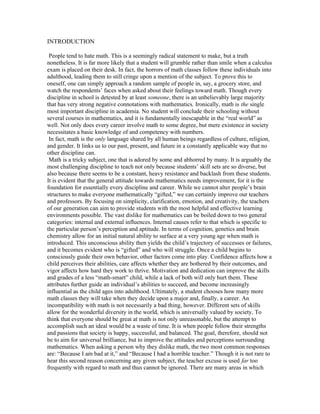Introduction 1
- 1. INTRODUCTION People tend to hate math. This is a seemingly radical statement to make, but a truth nonetheless. It is far more likely that a student will grumble rather than smile when a calculus exam is placed on their desk. In fact, the horrors of math classes follow these individuals into adulthood, leading them to still cringe upon a mention of the subject. To prove this to oneself, one can simply approach a random sample of people in, say, a grocery store, and watch the respondentsâ faces when asked about their feelings toward math. Though every discipline in school is detested by at least someone, there is an unbelievably large majority that has very strong negative connotations with mathematics. Ironically, math is the single most important discipline in academia. No student will conclude their schooling without several courses in mathematics, and it is fundamentally inescapable in the âreal worldâ as well. Not only does every career involve math to some degree, but mere existence in society necessitates a basic knowledge of and competency with numbers. In fact, math is the only language shared by all human beings regardless of culture, religion, and gender. It links us to our past, present, and future in a constantly applicable way that no other discipline can. Math is a tricky subject, one that is adored by some and abhorred by many. It is arguably the most challenging discipline to teach not only because studentsâ skill sets are so diverse, but also because there seems to be a constant, heavy resistance and backlash from these students. It is evident that the general attitude towards mathematics needs improvement, for it is the foundation for essentially every discipline and career. While we cannot alter peopleâs brain structures to make everyone mathematically âgifted,â we can certainly improve our teachers and professors. By focusing on simplicity, clarification, emotion, and creativity, the teachers of our generation can aim to provide students with the most helpful and effective learning environments possible. The vast dislike for mathematics can be boiled down to two general categories: internal and external influences. Internal causes refer to that which is specific to the particular personâs perception and aptitude. In terms of cognition, genetics and brain chemistry allow for an initial natural ability to surface at a very young age when math is introduced. This unconscious ability then yields the childâs trajectory of successes or failures, and it becomes evident who is âgiftedâ and who will struggle. Once a child begins to consciously guide their own behavior, other factors come into play. Confidence affects how a child perceives their abilities, care affects whether they are bothered by their outcomes, and vigor affects how hard they work to thrive. Motivation and dedication can improve the skills and grades of a less âmath-smartâ child, while a lack of both will only hurt them. These attributes further guide an individualâs abilities to succeed, and become increasingly influential as the child ages into adulthood. Ultimately, a student chooses how many more math classes they will take when they decide upon a major and, finally, a career. An incompatibility with math is not necessarily a bad thing, however. Different sets of skills allow for the wonderful diversity in the world, which is universally valued by society. To think that everyone should be great at math is not only unreasonable, but the attempt to accomplish such an ideal would be a waste of time. It is when people follow their strengths and passions that society is happy, successful, and balanced. The goal, therefore, should not be to aim for universal brilliance, but to improve the attitudes and perceptions surrounding mathematics. When asking a person why they dislike math, the two most common responses are: âBecause I am bad at it,â and âBecause I had a horrible teacher.â Though it is not rare to hear this second reason concerning any given subject, the teacher excuse is used far too frequently with regard to math and thus cannot be ignored. There are many areas in which
- 2. professors could improve their methods and styles of teaching that would in turn enhance their relationships with students. These ideas can be grouped into the following categories: simplicity, clarification, emotion, and creativity.


